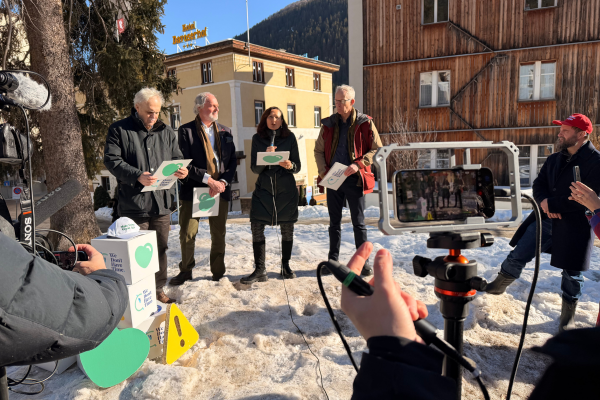A “Giant Leap” could end poverty in Kenya within a generation and bring economic prosperity, according to a new report. The report looked at two scenarios. The Giant Leap scenario explores five extraordinary turnarounds in the areas of poverty, inequality, empowerment, food and energy that could significantly improve the lives and livelihoods of Kenyan citizens. The alternative scenario, Too Little, Too Late, shows that poverty in Kenya will remain until late in this century.
The new analysis also includes findings from a new survey of Kenyan citizens conducted by Ipsos. The survey finds that 86% Kenyans support the need for rapid action this decade – a giant leap – to protect people from climate change and other environmental risks. To fund this transformation, according to the survey results, Kenyans strongly support progressive taxation including wealth taxes for the richest in society and higher corporation taxes.
“The Kenyan government is committed to transforming the economy and uplifting the poor through its Bottom-Up Transformation Agenda (BETA, 2022-2027). However, there still remain several challenges to achieving the Sustainable Development Goals for the country when it comes to poverty rates, food security, education levels, youth unemployment and female labour force participation, among others. This is why transformative action in line with Earth4All’s vision to achieve economic prosperity for all is absolutely critical. To achieve the Giant Leap, Kenya needs a high level of political commitment that includes innovative measures for resource mobilisation and tracking progress of the priority sectors identified in the BETA agenda,” comments Jane Kabubo-Mariara, Executive Director of the Partnership for Economic Policy and member of the Earth4All Transformational Economics Commission.
By making a radical transformation away from today’s extractive economy dominated by GDP growth to wellbeing economies that place a value on people, planet and prosperity and enacting the five turnarounds, for Kenya this would mean:
- The eradication of poverty by 2050
- Reduction of inequality (despite seeing economic growth) and all citizens having access to basic services by 2035
- Females in management positions would rise to 45% in 2050 (compared with 25% today)
- Gender parity in schooling would be reached in 2050
In comparison, if we continue our current path, 10% of Kenyans would still be living below the poverty line in 2050, 15% would have no access to basic services in 2050, and females in management positions would reach just 35% in 2050.
The most considerable changes are seen in the agriculture sector. Currently, less than 10% of harvested areas are sustainably managed, and this would remain the same in the Too Little Too Late scenario. However, 100% of harvested areas would be sustainably managed in the Giant Leap scenario, water use efficiency would improve considerably and agriculture production would rise to 3 trillion KES by 2050 (instead of staying at KES 1.8 trillion).
Waste collection and disposal in the Too Little Too Late scenario would remain as it is now, at around 30%. However in the Giant Leap, this will strikingly rise to 100% by 2050.
Energy consumption and emissions increase in both scenarios, but remain significantly smaller than high-income countries.
To achieve the pace and scale of change required for meaningful progress by 2050, the report identifies several policy levers which need to be implemented simultaneously such as:
- Restructuring of global financial debt (as advocated by Earth4All on a global scale).
- Improving debt management in Kenya, improving transparency, introducing debt ceiling regulations and having an independent body for oversight of the debt portfolio.
- Ensuring equal access to employment opportunities for all.
- Increasing investment in education and increasing awareness and interest in Science, Technology, Engineering and Mathematics (STEM) among girls from an early age.
- Providing financial support for small-scale irrigation schemes to complement large-scale, capital-intensive schemes, and investing in improving soil and seed quality.
- Providing input finance and intensive agricultural extension to elevate two million impoverished farmers to surplus producers.
- Adjusting energy tariffs and building awareness of clean cooking energy sources to promote their use.
The two scenarios – Too Little Too Late and the Giant Leap – were first introduced in the book Earth for All: A Survival Guide for Humanity, published in September 2022. The book concludes that there is still time to act to substantially reduce risks to societies and ensure economic security and wellbeing for all – and the five extraordinary turnarounds are the minimum actions needed to achieve this.
“The Giant Leap scenario offers a way out of the current planetary emergency and a pathway for inequality and poverty alleviation by 2050. However, we recognise that policy solutions must be tailored to the unique circumstances of each country and locality. That is why Earth4All has embarked on national engagement strategies to champion and establish locally relevant policies aligned with their core challenges and needs so that we transform our Earth4All policy proposals into tangible actions on the ground” comments Sandrine Dixson-Declève, co-president of The Club of Rome, co-author of Earth for All and executive chair of the Earth4All initiative.
The findings will be presented at the 7th KIPPRA Annual Regional Conference in Kisumu City, Kenya on 27 June 2024, which will be presided over by the President of the Republic of Kenya.



